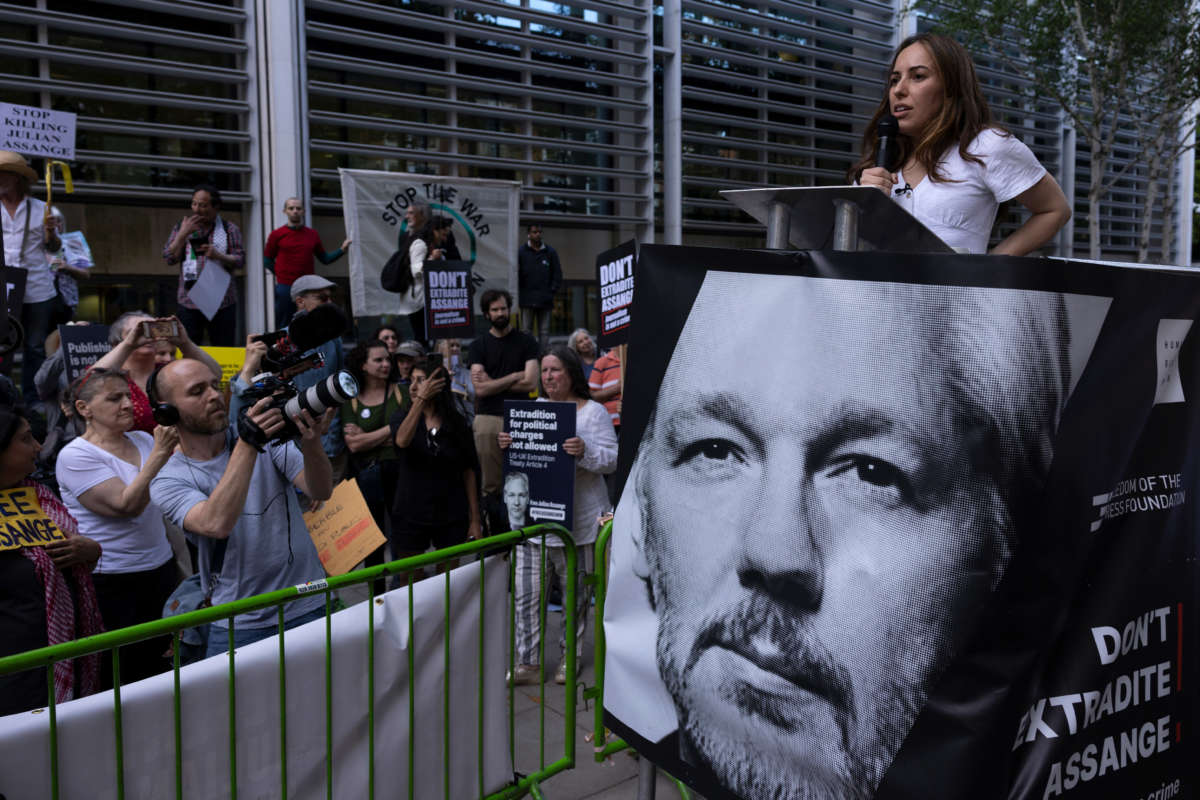Honest, paywall-free news is rare. Please support our boldly independent journalism with a donation of any size.
The U.K. government on Friday formally approved the extradition of WikiLeaks founder Julian Assange to the United States to face espionage charges, a decision that human rights groups condemned as a dire threat to journalism worldwide.
Assange, who has been detained in a high-security London prison since 2019, is expected to appeal the move by U.K. Home Secretary Priti Patel, whose office insisted that the publisher’s extradition to the U.S. would not be “incompatible with his human rights, including his right to a fair trial and to freedom of expression.”
But Amnesty International’s Agnes Callamard, who previously worked as a United Nations human rights expert, disagreed with Patel’s assessment, warning that “allowing Julian Assange to be extradited to the U.S. would put him at great risk and sends a chilling message to journalists the world over.”
“If the extradition proceeds, Amnesty International is extremely concerned that Assange faces a high risk of prolonged solitary confinement, which would violate the prohibition on torture or other ill treatment,” Callamard said in a statement. “Diplomatic assurances provided by the U.S. that Assange will not be kept in solitary confinement cannot be taken on face value given previous history.”
“We call on the U.K. to refrain from extraditing Julian Assange, for the U.S. to drop the charges, and for Assange to be freed,” Callamard added.
If found guilty of all 17 Espionage Act charges — which were originally brought by the Trump administration — Assange could face a 175-year prison sentence, which the U.S. has said he could serve in his native Australia. A British judge had previously rejected U.S. attempts to secure Assange’s extradition on the grounds that the country’s prison system is so brutal that it would endanger the journalist’s life.
The Biden administration has continued pursuing the charges against Assange despite vocal warnings and pushback from human rights and press freedom groups.
Stella Assange, the WikiLeaks founder’s wife, warned Friday that the U.K. government has “approved sending Julian Assange to the country that plotted his assassination,” referring to reports that the CIA — then under the leadership of Mike Pompeo — considered kidnapping or killing the journalist, who published classified information that exposed U.S. war crimes.
“We’re going to fight this… I’m going to spend every waking hour fighting for Julian until he is free, until justice is served” | Julian Assange’s wife responding to decision to approve his extradition to the US for publishing, where he faces a 175 year sentence @StellaMoris1 pic.twitter.com/vmNz7dA0x1
— WikiLeaks (@wikileaks) June 17, 2022
In a statement responding to Patel’s decision, WikiLeaks said that “this is a dark day for press freedom and for British democracy.”
“Anyone in this country who cares about freedom of expression should be deeply ashamed,” the organization continued. “Julian did nothing wrong. He has committed no crime and is not a criminal. He is a journalist and a publisher, and he is being punished for doing his job.”
“Today is not the end of the fight,” WikiLeaks added. “It is only the beginning of a new legal battle. We will appeal through the legal system, the next appeal will be before the High Court. We will fight louder and harder on the streets, we will organize, and we will make Julian’s story be known to all.”
Matching Opportunity Extended: Please support Truthout today!
Our end-of-year fundraiser is over, but our donation matching opportunity has been extended! All donations to Truthout will be matched dollar for dollar for a limited time.
Your one-time gift today will be matched immediately. Your monthly donation will be matched for the whole first year, doubling your impact.
This matching gift comes at a critical time. As Trump attempts to silence dissenting voices and oppositional nonprofits, reader support is our best defense against the right-wing agenda.
Help Truthout confront Trump’s fascism in 2026, and have your donation matched now!
